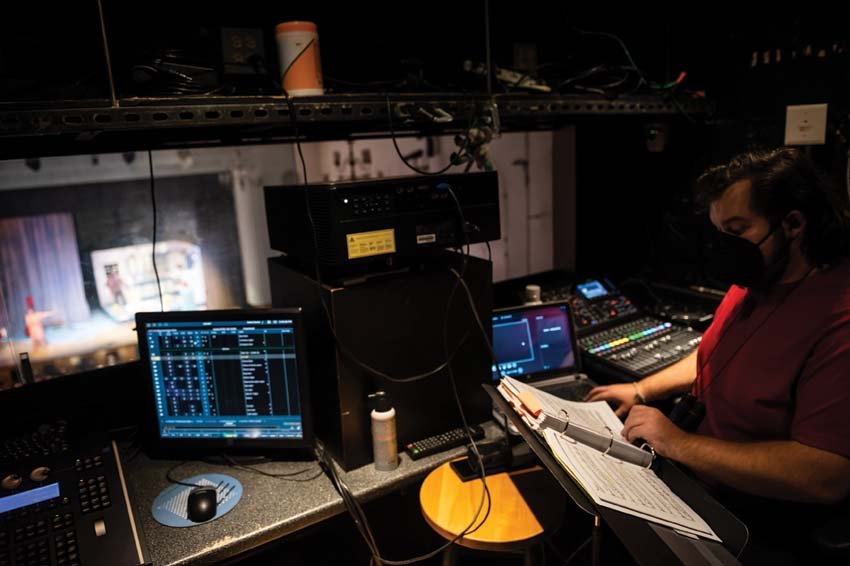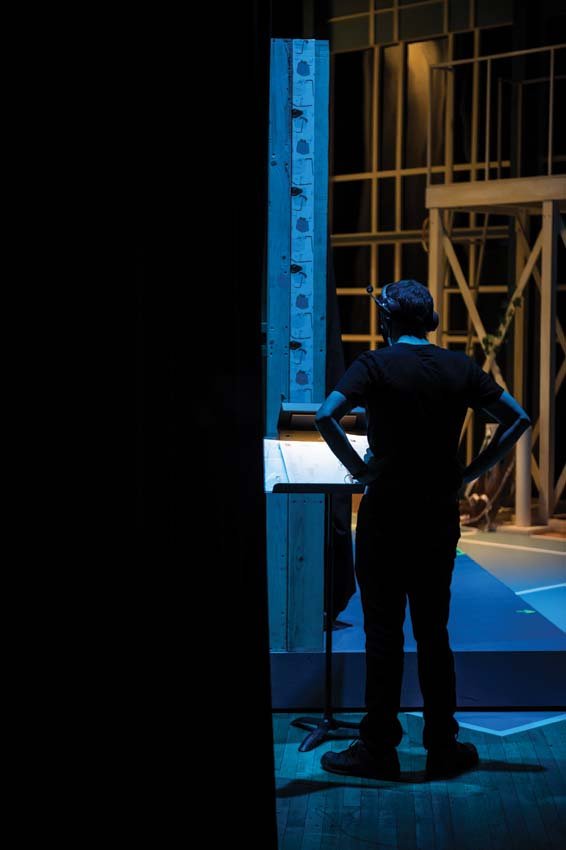+ By Dylan Roche + Photography by Alison Harbaugh
The first time Winship Wheatley ever tuned and operated a sound system in his role as head audio engineer at Maryland Hall for the Creative Arts, he received unsolicited praise from an audience member “A gentleman came up to the sound booth at intermission and was ecstatic, exclaiming, ‘The sonic landscape—congratulations!’” recalls Wheatley. That has stuck with him ever since.
The patron’s statement regarding the range and layers of sound in the performance venue made Wheatley realize how important tech is to the concertgoing or theatergoing experience. “He was right,” says Wheatley. “It blew me away, and the band, too. I have high standards now because of that moment, but it’s a good thing.”
A contractor with Maryland Hall, Wheatley is one of hundreds of professionals and volunteers who work behind the scenes to make those onstage look and sound their best. Over the years, he’s worked with music artists such as rock guitarist Paul Gilbert and luthier Paul Reed Smith. He’s had the opportunity to master the skill of providing world-class sound and to witness how it impresses even some of the performers. “Bands that play through systems that I tune, they’re typically blown away and, in many cases, never have the opportunity to play on a stage that has that kind of control,” he says.

This is part of the professionalism at Maryland Hall, which provides a venue where Annapolitans can enjoy performances from both local and national artists. Reilly Kelbaugh, the nonprofit’s front of house and volunteer manager, works every show and serves as a liaison between Maryland Hall techs and any company that uses one of the venue’s two performance spaces—either the main theater or the smaller Bowen Theater downstairs. “I don’t oversee the positions backstage, as my sphere of influence stops typically at the proscenium window of the stage [the area in front of the curtain], but I do coordinate with all of the backstage staff,” he says, listing such roles as stage manager, tour managers, technicians, and stagehands. “Maryland Hall has always utilized volunteers for important key roles during performing arts and visual arts.” For a performing arts event, volunteers are needed to serve as ushers and bartenders; occasionally, a select few serve in niche positions, such as stagehands.
Communication is the biggest key, according to Kelbaugh. That’s because nearly every company that takes to the stage at Maryland Hall operates a little bit differently and has different needs. Maryland Hall works with four resident companies—the Ballet Theatre of Maryland, the Annapolis Symphony Orchestra, the Annapolis Opera, and Live Arts Maryland—as well as various touring groups and companies that rent the theater.

Annapolis Opera, for example, brings its own scenery and props, whereas another company might need assistance building set pieces. The Annapolis Film Festival requires assistance with projection and audio whenever it screens a movie in the main theater, but the Annapolis Symphony Orchestra won’t need much auditory assistance because the sound it generates acoustically is sufficient to reach even those in the back row.
“Generally, all sound and lights are provided by Maryland Hall, except when there are specifics in a backline or groups that bring their own technicians that design, set up, run, and facilitate performances,” explains Kelbaugh. “At that point, Maryland Hall technicians act as liaisons between me and that specific company.”
The tech process starts even before a production company has access to the venue. Wheatley says he provides a brief overview of what Maryland Hall can accommodate. “We then get an input list and stage plot from the band, which helps us prepare, so we don’t waste time with routing all the microphone and instrument channels,” he says. “It can get pretty chaotic if you let it.”
Load-in will usually take the full day before a performance, and striking a production after its run will usually take just as long. Some performers bring their own equipment, while others rely on what Maryland Hall provides. “Some need it more, and some don’t need it at all,” says Wheatley. “Most of the Rams Head shows at Maryland Hall I don’t even need to be there for.” As a musician with his own band, he goes through the same process when he visits a venue. “With my band, we sometimes bring an entire sound system to the venue. More often, we tie into their system.”

But in some situations, a company needs to call on the experts at Maryland Hall to do what they do best. This is often because the company needs a very specific type of tech for their program or event. “This is a regular occurrence, when a production company requires specialized skills, like a projectionist for Annapolis Film Festival or a laser operator who has the experience working with laser light performances,” says Wheatley. “The one that comes back to me is the amazing work done at the Pink Floyd Laser show that we had, a while back. Orientation of those machines takes specific operational knowledge, as the lasers are absolutely powerful enough to cause serious damage to one’s eyes.”
And even though they aren’t the ones onstage that the audience is watching the whole time, these behind-the-scenes artists take joy in knowing that their work is an integral part of the production process. “It’s my passion,” Wheatley says of sound engineering. “It’s always been my passion to have my band sound better and better. I always had band practice at my house, so . . . I always had time to learn about it and tweak it. Eventually, I learned more about some of the elementary ways of tuning sound systems. When I came to Maryland Hall, I said, ‘If you give me three months to work it all out, I’ll know how to do this in a way that most people don’t know how to do it.’”
The tech crew also has the chance to interact with a wide variety of famous and more obscure performers who come to them. “Meeting artists is definitely a cool aspect of any tech or behind-the-scenes job, whether they are classical or popular performing artists,” says Kelbaugh. “Another great feeling, and associated with many memories, is providing arts experiences for the next generation. Let us admit that we all enjoy a good show—nothing wrong with a night out at a theater to see your favorite touring group or subscribing to see your favorite resident company perform.” █
To learn more about Maryland Hall for the Creative Arts,
visit www.marylandhall.org.

Maryland Hall Front of House and Volunteer Manager, Reilly Kelbaugh puts away chairs in the Bowen Theater while resetting the space after a film screening the past weekend. Photo by Alison Harbaugh 
Maryland Hall Front of House and Volunteer Manager, Reilly Kelbaugh and Director of Facilities, Dennis Coughlin move a piano from a prop room back into the Bowen Theater while resetting the space after a film screening the past weekend. Photo by Alison Harbaugh 
David Clark, Jr., part of the Maryland Hall tech team helps to setup walls on stage before an Annapolis Symphony performance. Photo by Alison Harbaugh 
A view of the stage at Maryland Hall between a tear down of the Annapolis Opera performance last weekend and the setup of the Annapolis Symphony for this coming weekend. Photo by Alison Harbaugh 
Ryan Walsh, a member of the Maryland Hall tech crew, helps to set up for an upcoming stage performance by the Annapolis Symphony. Photo by Alison Harbaugh 
Ryan Walsh, a member of the Maryland Hall tech crew, helps to set up for an upcoming stage performance by the Annapolis Symphony. A red Vespa prop from last weekend’s Annapolis Opera performance sits off stage, Photo by Alison Harbaugh 
Reilly Kelbaugh, front of house and volunteer manager with Maryland Hall checks to make sure attendees to a recent Annapolis Opera performance are vaccinated before ushering them into the auditorium. Photo by Alison Harbaugh 
Maryland Hall volunteers Kathy Hennes (L) and Barbara Wingrove (R) serve drinks to Annapolis Opera attendees before the start of a recent performance at Maryland Hall. Photo by Alison Harbaugh 
During a recent performance by the Annapolis Opera, supertitles operator, Henrique Carvalho follows along with the script as he projects the translated lyrics or dialogue above the stage in English which makes it easier for the audience to follow along during the opera. Photo by Alison Harbaugh 
Assistant stage manager, Steve Mangum waits just off stage before a recent performance by the Annapolis Opera at Maryland Hall for the Creative Arts. Photo by Alison Harbaugh 
Maryland Hall volunteer ushers hand out programs and show people to their seats during a recent performance by the Annapolis Opera. Photo by Alison Harbaugh
